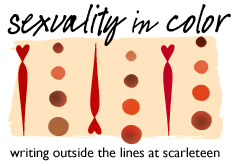 Here's another installment of our first-person profiles of queer people of color. If you're
queer
and of color, we're hoping this series can illuminate some of your own diversity, allow you to feel less isolated and know you're not alone. Queer youth (and queer people on the whole) are often isolated. That isolation hurts and can and does do very real damage. LGB young people who are also oppressed, marginalized and rendered doubly invisible because of race tend to face even greater challenges and isolation.
Here's another installment of our first-person profiles of queer people of color. If you're
queer
and of color, we're hoping this series can illuminate some of your own diversity, allow you to feel less isolated and know you're not alone. Queer youth (and queer people on the whole) are often isolated. That isolation hurts and can and does do very real damage. LGB young people who are also oppressed, marginalized and rendered doubly invisible because of race tend to face even greater challenges and isolation.
No matter who you are or what your deal is, we think you'll find these profiles challenge many perceptions and may make you reconsider or refine ideas or questions about orientation and race. It can also help you and others grow your compassion and your care, better understanding that every kind of marginalization and oppression both does very real harm and always has the capacity to do so, especially if it goes unseen and unheard.
Corinne, 25
Color/race you are/identify with: Black
When did you realize you were gay , lesbian or bisexual ? I was 15.
How did you feel about that realization? I, personally, felt fine about the realization. I hadn't dated any male or female at the time yet and knew that I didn't have to in order to be queer.
Have you been able to come out ? I came out willingly to my school friends, and to my older sister shortly after I realized I was queer. I was only bullied very little at my predominantly white high school, partly because the other students were terrified of me.
I knew my own parents were no good to come out to. My mother is super-religious, and my step-dad has mental-health issues that make him speaking with him about any topic difficult, if not impossible. However, I was outed to my mother by a co-worker of hers a few years ago. I confirmed her questions about it and we haven't spoken about it since.
How supported do you feel by your own family and your community of color? My family is supportive of my life, as long as they get to ignore the queer part. I know they can't handle it so I don't talk about it with them. As for my community of colour, the only one I've ever really been a part of is my mom's church family, and I know they wouldn't be able to handle it either.
How about by the queer community? As a bisexual, I can't say I feel particularly supported by the queer community.
How has managing your romantic / sexual relationships gone? In what, if any, ways do you feel being a GLB person of color has impacted your relationships? It hasn't, really. I think my poor record with relationships is more just a personal thing.
What do you feel are particular challenges for gays, lesbians and bisexuals of color? Many of us are from very religious backgrounds. They do not accept us, and are very slow to change. They will fight us until they die, so I feel that our best bet is just to let a couple of generations pass, unfortunately.
How do you feel others can help with those challenges? I have a pretty pessimistic view of this particular challenge. Many of us are forced to choose between being honest with our families, or having families.
Does one kind of bias you face -- racism vs. homo/ biphobia -- feel larger, more oppressive than the other? Homophobia is more oppressive to me because it separates me from my own family. After all, they are the same colour as I am.
What do you feel like GLB people who are not of color don't get about the differences being GLB of color? What about hetero white people: what do they miss? I think queer white people sometimes don't appreciate the privilege of family acceptance. Of course, I know that not all white queers enjoy that privilege, but as far as I know it seems almost non-existent among black communities.
Want to be part of this series and share your experiences and ideas about being gay, lesbian or bisexual and of color? We'd love to include you and get your voice out there. Drop us an email and we'll send you the questions!
